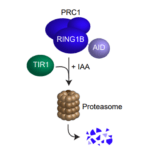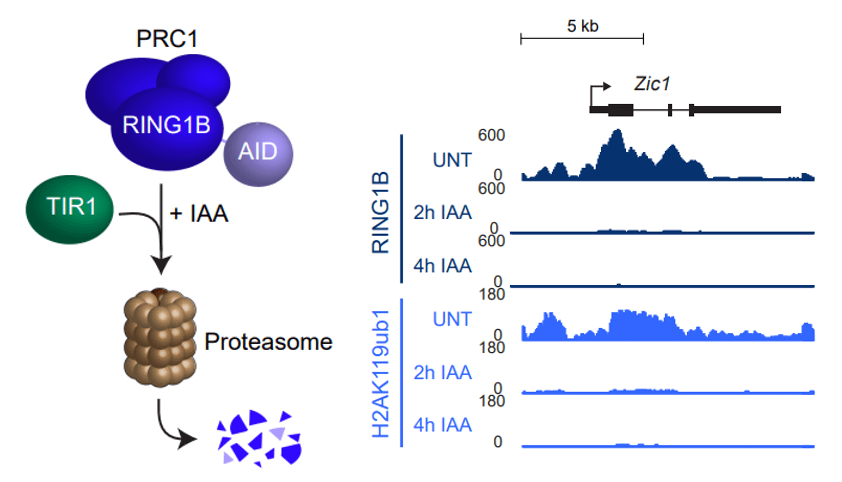
Recent discoveries from Lister Fellow Rob Klose’s lab were recently published in Nature Structural & Molecular Biology. Meanwhile, Ragnhildur Thóra Káradóttir has published two reviews about how myelin changes throughout life.
Recent discoveries from Lister Fellow Rob Klose’s lab reveal a mechanistic and conceptual framework for Polycomb-dependent transcriptional control.

Klose Lab researchers Paula Dobrinić and Aleksander Szczurek investigated the Polycomb repressive system, which plays a fundamental role in controlling gene expression during mammalian development. Their work reveals the specific components of Polycomb chromatin domains that drive gene repression and identifies the mechanisms involved.
Paula Dobrinić explains more about the research: “We combined rapid targeted proteolysis and time-resolved genomics in mouse embryonic stem cells to discover that Polycomb repressive complex 1 (PRC1) and H2AK119ub1 are key components of Polycomb chromatin domains that elicit gene repression independently of PRC2 and H3K27me3.”
“Gene repression is achieved by counteracting binding of RNA polymerase II to promoters and transcription initiation. Furthermore, our single-cell imaging experiments revealed that PRC1/H2AK119ub1 limits transcription burst frequency and counteracts low level activation signals uniformly across the cell population.”

The paper ‘PRC1 drives Polycomb-mediated gene repression by controlling transcription initiation and burst frequency‘ was published in Nature Structural & Molecular Biology in early October.
Professor Rob Klose of the University of Oxford was awarded the Lister Prize in 2011. Paula joined his lab as a postdoc in 2017 to pursue her interest in gene regulation through chromatin-based and epigenetic processes. This work has been a stepping stone into her new position in the biotech industry, where she is employing her new skills to develop new immunotherapeutics.
“Rob’s lab is a motivating environment where I was surrounded by smart, enthusiastic, and passionate scientists,” says Paula. “Among other things, this role enabled me to develop my bioinformatics skills and a passion towards using computational tools to address challenging biological problems.”We are delighted that Lister funding supported the next-generation sequencing experiments essential to this project.
The next step for this area of research will be to identify molecules or processes by which PRC1/H2AK119ub1 elicits its effect on transcriptional machinery to block initiation.
You can read more about the Klose Lab’s research on their website here.
Ragnhildur Thóra Káradóttir recently published two reviews about how myelin changes throughout life.

Thóra, of the University of Cambridge and the University of Iceland, was awarded the Lister Prize in 2016. She is using the funding to help translate her research into therapy for demyelinating disease.
Her latest review, ‘Periods of synchronized myelin changes shape brain function and plasticity,’ was published in Nature Neuroscience at the end of October.
The paper reviews research to understand how myelin – the lipid membrane surrounding axons – changes throughout a person’s life.
The growing body of literature suggests that myelin plasticity may provide the regenerative potential of the CNS white matter and the review raises the question of whether changes in myelin may underlie neurological disorders.
Earlier in October, Thóra published another review in Science: ‘Myelin: A gatekeeper of activity-dependent circuit plasticity?’
You can find out more about Thóra’s research on her research profile.



